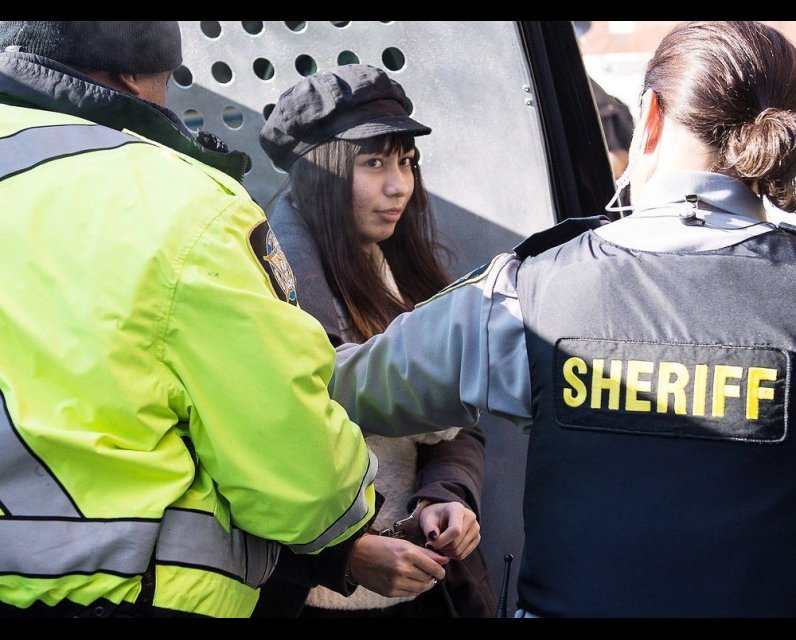Halifax mall murder plotter who 'carried the swastika with pride' denied parole

An American serving a life sentence in Canada for plotting a Valentine’s Day massacre at a Halifax mall with the help of two Nova Scotians she met online has been denied full parole.
Lindsay Kanitha Souvannarath, of Geneva, Ill., was arrested at Halifax Stanfield International Airport on Feb. 13, 2015, before they could carry out their plan the next day, which “included wearing ‘death outfits'” to Halifax Shopping Centre, “throwing Molotov cocktails, and then opening fire in the food court,” said her recent parole decision, released Tuesday.
“You intended to be armed with accomplice #1’s father’s shotgun, while he would be armed with his father’s hunting rifle and a knife. You planned to save the final bullets for yourselves for a joint suicide. You also planned to have scheduled online media posts that would go live on February 15, 2015, boasting about the mass shooting.”
Their plan never got off the ground.
Police arrested Souvannarath, now 33, when Randall Steven Thomas Shepherd, the “cheerleader” behind the foiled mass shooting, came to pick her up at the airport after someone tipped off Crime Stoppers about the plot. Shepherd pleaded guilty in October 2017 to conspiracy to commit murder. A judge sentenced him to a decade behind bars, but that was whittled down to seven years and four months due to the time Shepherd served on remand. He got out in the fall of 2021 on statutory release — the law that requires federal offenders who have served two-thirds of a fixed-length sentence be released from prison under supervision.
Souvannarath’s “accomplice #1,” James Gamble, killed himself after police surrounded his family’s Timberlea, N.S., home when they learned about the mass murder plot that involved first killing his parents, then using a rifle and shotgun and Molotov cocktails to murder strangers in the mall food court.
Souvannarath met Gamble online. They bonded over a shared fascination with the 1999 Columbine school shooting.
“He lived in Halifax. You spent most of your time online, and often posted/shared racist materials, promoted Nazism, and/or material that glorified violence and death,” said the recent decision denying her full parole.
“Accomplice #1 had a blog that glorified the Columbine massacre, and you bonded over your shared fascination with the massacre. You started communicating every day, spanning over a seven-week period, usually for hours a day. The nature of your online relationship was sexual. You exchanged explicit photos of each other while having sexually related conversations and expressed a desire to lose your virginity to each other.”
The pair planned to spend the night at Gamble’s home, where they would “consummate” their relationship before carrying out their deadly plot.
Souvannarath pleaded guilty in 2017 to plotting with Gamble to use rifles and Molotov cocktails to kill people at a Halifax food court on Feb. 14, 2015. In April of 2018, a judge sentenced her to life in prison and set her parole eligibility at 10 years.
“It is noted that your intention was to inflict as many casualties as the ammunition would allow,” said the parole board.
Shepherd “had his own blog glorifying violence and pornography,” according to Souvannarath’s parole decision. “In February 2015, he filmed videos of where the attack was to happen in the mall.”
While Shepherd helped plan the attack, he “was not agreeable to raising a weapon,” said the decision.
Souvannarath snuck out of her house on Feb. 12, 2015, took a train to the airport and boarded a flight for Halifax.
But the Canada Border Services Agency had been notified about the Crime Stoppers tip and was on the lookout for her.
“You had been detained in secondary inspection due to CBSA’s suspicions. Your luggage was searched, and all you had was make-up, your ‘death outfit,’ and two books on serial killers.”
Police arrested Souvannarath and Shepherd at the airport.
In her recent appearance in front of the parole board, Souvannarath’s assistant argued that she no longer believes in the violent ideology linked to their mass murder plot.
“He explained that you have matured and have stabilized on medication,” said Souvannarath’s parole decision. “In his view, you have insight and more empathy. He underscored that your behaviour has improved, that you have changed and highlighted that you have cascaded from a maximum institution to a medium institution.”
Her assistant told the board Souvannarath’s mother could manage her if she was released from prison.
“According to the psychological risk assessment completed in May 2025, you present a high-medium risk for general recidivism and a high risk for violent recidivism. The clinician noted if you were to re-offend, it would likely be in the context of returning to your core values (fascism/nationalism), increased life stressors, lack of a highly structured environment, and falling down other ‘rabbit holes.’ The clinician also noted secondary concerns related to your poor interpersonal skills, your poor sense of self, low emotional awareness, and your ease of being influenced by others who share similar beliefs.”
The parole board found that Souvannarath’s “many self-control problems” limit her “ability to inhibit antisocial behaviour.”
Authorities have identified her as “an ideologically motivated violent extremist,” said the parole board.
“You admitted to historically holding racist and anti-Semitic beliefs belonging to a web forum organization. Through your experience in this organization, it is reported that you became a ‘die-hard revolutionary willing to sacrifice everything for the cause.’”
While behind bars, Souvannarath connected with a crime podcaster, said the parole board.
“After you transferred to federal custody, it was discovered that you had participated in several phone interviews with the podcaster,” it said. “In these interviews, you described the planned murder and your neo-Nazi beliefs. The podcaster did not go through the proper channels to get permission to interview you, and you did not disclose the interviews and/or the podcast to your (case management team).”
Souvannarath “had video visits with him,” said her parole decision. “You reported being in a romantic relationship with him from 2020 to 2024, and that it did not concern you that he had a wife and children. You have said you eventually gave him an ultimatum to choose either you or his wife, and he chose his wife. This breakup was difficult for you, and you experienced significant emotional dysregulation coping with the end of the relationship.”
The podcaster denied Tuesday having an affair with Souvannarath.
In May 2021, the Correctional Service of Canada learned Souvannarath had been “sending drawings and letters from prison that called for violence to an influential American neo-Nazi, who posted some of (her) content on his blog. This individual is deemed a terrorist in Canada.”
In her first letter to him, Souvannarath wrote about “violence against sub-humans, and (how she) carried the swastika with pride.”
“There is nothing wrong with hate,” Souvannarath wrote. “Hate is what protects and perfects us as a race. Hate makes us all stronger. Hate needs no other cause to justify it, for it is noble in itself. Anyone who opposes hate does not belong in our world. We do not need the support of weak people.”
The influential neo-Nazi sent her money to pay for calls to the U.S.
“You said you felt he was considering you as his replacement in the movement. The board deems your insight into this high-risk situation problematic, you were receiving money from an individual listed as a terrorist entity in Canada at the same time you were participating in programming that was targeting your violent ideologies.”
In October 2021, a prison warden denied Souvannarath “a request for a copy of the book, Lone Wolf,” said the parole board, which notes “that the book is an account of the individual that bombed the 1996 Atlantic Olympics and explores the subject’s connection to neo-Nazi and religious extremist groups.”
In March 2024, authorities seized notebooks and drawings from Souvannarath’s cell that “included violent scenes, Nazi symbols, and referenced a manifesto outline.”
Souvannarath attempted suicide in April 2024 “because your relationship with the (crime) podcaster ended after he chose to stay with his wife,” said the parole board.
“In the following months, your anger and hate towards the podcaster’s wife escalated and you endorsed fantasies of destroying her life and launching a hate campaign against her with the help of your followers. You spoke of fantasies of your followers torching baby showers and displayed hate against married women and children.”
Souvannarath met in May 2024 with two staffers with the Canadian Security Intelligence Service (CSIS), said the parole board.
“After the meeting, you wrote a letter to the male CSIS member complaining about the meeting, and the letter included hate filled speech and derogatory comments towards the female CSIS member.”
Souvannarath’s letter ended with, “I am not looking for love … I’d much rather look for married men so I can destroy the lives of as many mommies as I possibly can. It feels good to have a new enemy.”
Her recent parole denial, which came out of Kingston, Ont., does not name the prison where Souvannarath is doing time.
Souvannarath, a U.S. citizen, has a deportation order hanging over her head for whenever she is released. She had planned to stay with family if she got parole.
But the parole board didn’t give her that chance, believing Souvannarath would likely return to crime.
“Your offending was fueled by hostile attitudes towards others and thinking that was supportive of violence. You were involved in planning a devastating attack which could have resulted in mass casualties. Your actions would have had profound and far-reaching consequences for Canadian society.”
There is “sufficient available, relevant, and reliable information to suggest that you have been in your offence cycle throughout your sentence, and most concerning, this behaviour occurred while you were participating in programs that target your risk factors,” said her parole decision.
“The board is not satisfied that you have internalized the skills that you were taught in programming to mitigate your risk. You have made conscious decisions to deceive people about your thoughts that support radicalized violence.”
Our website is the place for the latest breaking news, exclusive scoops, longreads and provocative commentary. Please bookmark nationalpost.com and sign up for our daily newsletter, Posted, here.



Comments
Be the first to comment